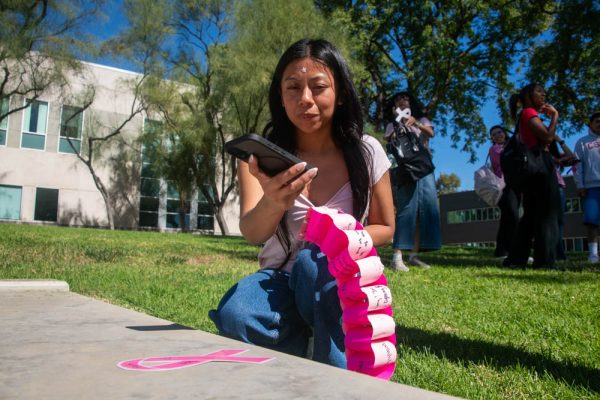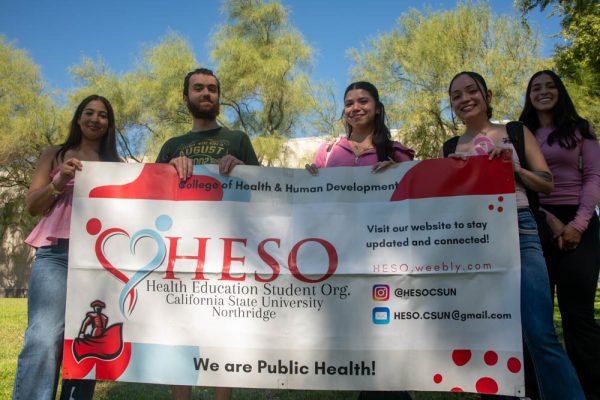Low turnout for breast cancer walk highlights awareness gaps
The Health Education Student Organization (HESO) at CSUN hosted a breast cancer awareness walk from 11:30 a.m. to 1:30 p.m. on Monday, bringing together a crowd of approximately 15 students and faculty.
HESO, which has been around for more than 20 years, is an official student organization that represents public health undergraduates at CSUN. This organization is known for participating in outreach events, such as Relay for Life, Walk MS and other health-related events, to promote community education and advocate for awareness.

Although the event had a slow start, HESO Public Relations Chair Jennifer Puac remained optimistic about the impact their presence may have at the end of the walk.
“We’re hoping that maybe more people will come or maybe there will be more people joining us as we’re walking,” Puac said. “We wanted to organize this walk just to advocate for the survivors, as well as patients currently battling breast cancer and spread awareness.”
The walk started near the Matador Statue and was aimed to raise awareness about breast cancer and to support survivors, current patients and those affected by the disease in any way. Attendees wore pink as a representation of their support as they circled the campus to the University Lawn, then to the Sierra Quad before returning to the statue.

Throughout the walk, HESO members and fellow attendees engaged in conversation. Robyn Parks, a public health professor at CSUN, joined the walk, sharing her encouragement while speaking with some of the attendees.
HESO Vice President Mariana Alatorre emphasized that events like their Breast Cancer Awareness Walk or AIDS Walk are important because they provide more than just information.
“You really don’t know what people might be going through,” Alatorre said. “Maybe somebody here has a cousin or a family member going through it, and this event could be some sort of hope for them or a space where they feel safe.”
According to Alatorre, the organization focuses on educating the community, both on and off campus.
“Last week we did the AIDS Walk in L.A., so we had our members go out there and support,” Alatorre said. “We raised around $230 to $250 to donate.”
Breast cancer remains one of the most common cancers throughout the world. Data from the American Cancer Society and National Cancer Institute show that the five-year survival rate varies drastically based on the stage of breast cancer someone is diagnosed with. When caught early, the survival rate for women is 99.6% and 95% for men. When caught late, especially at stage 4 when cancer spreads to other distant organs of the body, the survival rate declines to 31.9% for women and 20% for men.
While it may be treatable in early stages, breast cancer is not considered a curable disease. Treatments for breast cancer can help manage the disease and cure it for some, but remission is not guaranteed.
Increased public awareness of breast cancer is also important in catching the disease early on. However, recent research shows that interest in breast cancer awareness has decreased since 2004. A study from 2021 found that online searches for breast cancer have dropped since its peak interest in 2012, which was around the time that the National Football League “Pink October” campaign began to wind down.
“There’s still a lot of people unaware of breast cancer, ” HESO Public Relations member Valerie Garcia said. “To educate our campus and get the word out about things like self-exams and how important they are is our goal.”
More information about HESO and upcoming health awareness events can be found on their website or Instagram.
Latest Daily Sundial
- 13 spooktacular films to watch on HalloweenLook no further for the perfect spine-chilling movie for a laid-back Halloween. From the classic zombie apocalypse sub-genre to chilling teenage slasher movies, anyone is sure to find the ideal...
- Women’s basketball looks to seniors for leadership on and off the courtAhead of the 2025-2026 women’s basketball season, the Matadors are focusing on building their “foundation, culture and chemistry,” head coach Angie Ned said. This year, the team will be led...
- Fall 2025, Issue 3 Sudoku solutionsEasy Hard
- Paws Up at DogtoberfestPaw and beer lovers unite, Dogtoberfest is making its return to the South Coast Botanic Garden in Palos Verdes. The Bavarian-inspired event puts a furry spin on Oktoberfest. Dog owners...
- Women’s volleyball wins big against Long Beach StateThe Matadors bounced back from a shutout loss against UC Davis earlier in the week and toppled Long Beach State on Thursday night in a thriller at the Premier America...
- Prop 50: Know before you voteGovernor Gavin Newsom and President Donald Trump engage in a tug of war over the number of U.S. House seats. California voters can expect a special election on Nov. 4,...






